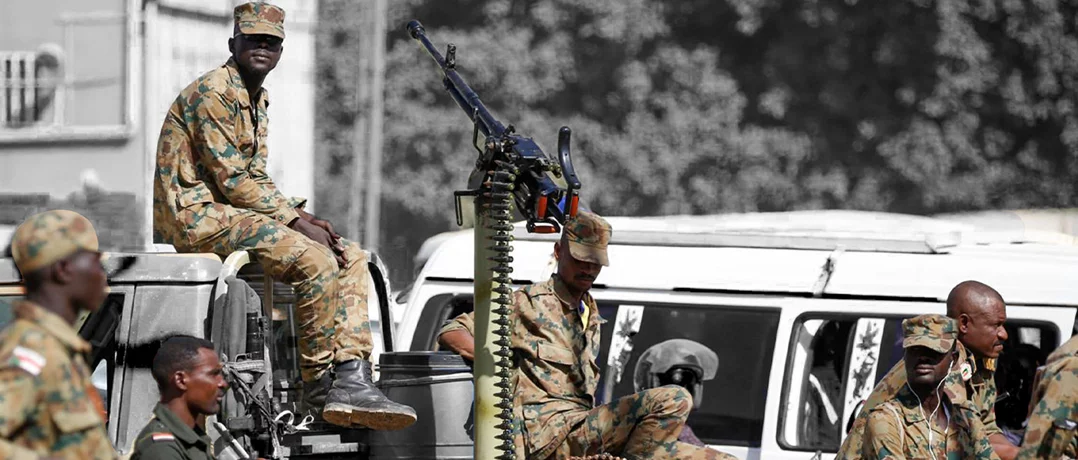The RSF takeover of el-Fasher sparks global alarm over escalating violence and potential atrocities in Sudan.
RSF takeover of el-Fasher, amid atrocities concerns
RSF takeover of el-Fasher, amid atrocities concerns


The Sudanese civil war just took a new an unprecedented turn, one with detrimental consequences on the civilian population as well as the geopolitical landscape. Sudan’s paramilitary Rapid Support Forces (RSF) has taken full control of el-Fasher, the last major urban center and Sudanese army’s stronghold in western region of Darfur. In a statement, the RSF claimed it had “extended control over the city of el-Fasher from the grip of mercenaries and militias,” referring to the Sudanese Armed Forces (SAF).
After besieging the capital of North Darfur for a staggering 18 months, the RSF managed to takeover this critical strategic area, dealing a major blow to the SAF and driving Sudan’s future into obscurity.
Atrocity crimes concerns
Around 250,000 Sudanese remain in the fallen area. These civilians, however, are facing an imminent threat of crimes and human rights violations – some might even amount to international “serious crimes” (including war crimes, crimes against humanity and genocide).
Ever since the fall of el-Fasher, reports of atrocities being committed have risen to headlines. On October 27, 2025, the United Nations Human Rights Office of the High Commissioner (OHCHR) claimed that it had received numerous alarming reports that the RSF are carrying out atrocities, including summary executions of civilians trying to flee as well as those considered hors de combat (meaning those no longer participating in armed conflict). The office’s High Commissioner for Human Rights, Volker Türk, asserted that “in el-Fasher, initial reports indicate an extremely precarious situation since the RSF yesterday announced its takeover of the army’s 6th Infantry Division.”
Furthermore, on October 29, 2025, the Sudan Doctors Network claimed that during the past 3 days, the RSF has killed at least 1,500 people, describing it as “a true genocide.” It added that “the massacres the world is witnessing today are an extension of what occurred in el-Fasher more than a year and a half ago, when over 14,000 civilians were killed through bombing, starvation, and extrajudicial executions.” Among those massacred at the hands of the RSF were over 450 patients and their companions at the Saudi Hospital.
Meanwhile, the “Tasis” coalition (which was established on February 22, 2025, as an opposing alliance to the SAF, and includes the RSF, the Sudan People’s Liberation Movement-North, the Revolutionary Front, in addition to splinter groups from the National Umma Party and the Democratic Unionist Party) released a statement denouncing the aforementioned allegations. It expressed its “condemnation of any violations,” vowing to prevent such crimes by forming an investigative committee. However, the latter will be seeking to “verify the authenticity of these videos and allegations,” without any mentioning of potential punitive measures, since the coalition believes that “many of the violations and videos being circulated on social media platforms are produced by the media of the Islamic movement, mercenaries of the Joint List, and others. If they are scrutinized, this will become clearly noticeable.”
On his end, the diplomatic advisor to the President of the United Arab Emirates, Anwar Gargash, confirmed in a statement on his X account that “the Sudanese army's loss of the city of el-Fasher after a long siege represents a stage that requires prudence and realism, and the realization that the political path is the only option to end the civil war,” simultaneously reemphasizing the importance of relying on the Quartet’s roadmap constitutes “the internationally supported framework for restoring stability.”
The ongoing Sudanese civil war
Since April 2023, Sudan has been plunged into a severe and deadly civil war between the Sudanese army and the RSF. The two sides have been bogged down in an intense power struggle regarding the country’s leadership.
Following the fall of the long-serving President Omar al-Bashir, who has been in power since 1989, a joint military-civilian government was formed. However, this cabinet was short lived as an October 2021 coup, staged by General Abdel Fattah al-Burhan (the head of the armed forces and in effect the country’s president) and his deputy, RSF leader General Mohamed Hamdan Dagalo (known as “Hemedti”), led to its demise.
Despite this brief alliance, the two men differed drastically on the country’s direction, especially with regards to plans of incorporating the RSF into the army. As disagreements widened, tensions grew as well, leading to an all-out civil war on 15 April 2023. Ever since, over 150,000 people have been killed and around 12 million have been displaced, prompting the United Nations to raise the alarm and claim the conflict to be the world’s largest humanitarian crisis.


